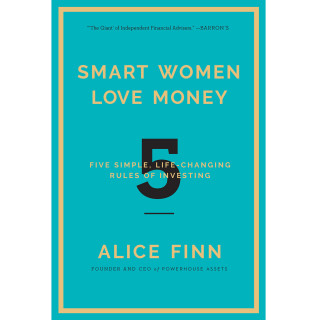The Unnecessary Risk Too Many Women Take with Their Money
Are you worried about getting swindled out of your savings or losing everything in a crash? Alice Finn, the author of Smart Women Love Money, explains the simple ways to avoid those catastrophes.

Illustration: Iratxe Lopez De Munain
If I stopped a random woman on the street and asked her what she thought the biggest controllable risk to her long-term portfolio potential was, I can almost guarantee she wouldn't guess the right answer. She might say it was the risk of being invested during a big market downturn, like the bursting of the dot-com bubble or the great recession of 2008. She might mention the possibility of being taken for a ride by a Ponzi schemer like Bernie Madoff, or investing in a fraudulent company or one that goes bankrupt. Perhaps she'd mention the risk of not investing at all—sitting on the sidelines and watching as the market goes up without her taking advantage and growing her assets.
Yes, market declines come and go, but if you remain invested in a diversified portfolio of low-cost index funds and regularly rebalance, you ensure you'll always be in a position to profit from the upturns when they come. If you're sticking to index funds, there is no risk you'll end up in the clutches of a Bernie Madoff and his "proprietary" (in this case, downright illegal) investment strategies and products, because you'll be buying plain vanilla funds that trade in the public markets. And of course, you'll be staying invested at all times, because that's the key to making money at all. As long as you invest, and stay invested, your returns keep compounding. The more time you have, the more you can reinvest those earnings and leverage the potential of your original assets.
But there is another risk, and it's one that almost no one ever seems to consider. The one most of us forget about until it's too late. It doesn't grab headlines in the same way a market crash or a renegade money manager might. But it can wreak havoc on how much money you end up with when you have to look at how your nest egg will provide for you and your family.
Fees. Even if you follow the other four fundamentals (invest in stock for the long run, allocate your assets, implement using index funds, rebalance regularly) exactly as I advise in my book, if you fail to follow this basic rule—keep fees low—you risk forfeiting a significant portion of the wealth you will have accumulated over time. You will have to pay some fees—that's just the cost of doing business—but unlike in other industries, you don't necessarily get more for your money if you pay high fees to invest. And in most cases, you actually end up with less. Actively managed funds often charge higher fees than index funds because the costs associated with managing them are so high. But these funds, over the long run, don't end up doing as well as the market, so you end up giving up more money than you would have had you stuck to the cheaper, more straightforward option. But fees can hide in all sorts of places, so it's important to be aware of them and to make sure you're not paying more than you need to be. That's why keeping fees low is so fundamental.
In an effort to illustrate just how much fees can eat into your earnings, let's imagine a 35-year-old woman with about $100,000 in assets. Using history as a guideline, it's fair to say this woman could expect to earn an average of 6.5 percent a year in her investment portfolio. If she pays 1 percent a year in fees, she will end up earning 5.5 percent a year instead of 6.5 percent, and within thirty years, her $100,000 will be worth almost $500,000—not too shabby. But if she ends up paying 2 percent a year in fees and therefore earns only 4.5 percent a year in returns, she will end up with only $375,000, paying more than 30 percent ($125,000) of the $400,000 profit she could have earned to fees. Take those fees up one more notch to 3 percent, and her $100,000 will grow to a mere $280,000 over the next thirty years. In other words, this woman will have forfeited more than half her potential investment gains and almost half her ultimate potential wealth by paying those extra two percentage points in fees! This is the downside of compounding.
The more money you have, the greater the potential wealth you will forfeit if you pay too much in fees. If you have $1 million dollars and pay 3 percent in fees over thirty years, you will end up with roughly $2.8 million at the end of the day. If you only pay 1 percent, however, you'll end up with nearly $5 million. Maybe you're thinking, I don't need $5 million to retire; $2.8 million would be more than fine with me! That may be true, but think of all that you could do with that extra money! You could pay for education expenses for your family or provide for them in other ways in the future, even long after you're gone, start a foundation that supports a cause important to you, or invest in your best friend's brilliant business idea so she can get it off the ground. The point is: why forfeit money when you don't have to?
 This is an adapted excerpt from Smart Women Love Money by Alice Finn (Regan Arts, April 2017). Alice Finn is a wealth management expert. She is the CEO of PowerHouse Assets LLC, a firm she founded to help women become more engaged in their important financial matters.
This is an adapted excerpt from Smart Women Love Money by Alice Finn (Regan Arts, April 2017). Alice Finn is a wealth management expert. She is the CEO of PowerHouse Assets LLC, a firm she founded to help women become more engaged in their important financial matters.
Want more stories like this delivered to your inbox? Sign up for the Oprah.com Money Newsletter!
Yes, market declines come and go, but if you remain invested in a diversified portfolio of low-cost index funds and regularly rebalance, you ensure you'll always be in a position to profit from the upturns when they come. If you're sticking to index funds, there is no risk you'll end up in the clutches of a Bernie Madoff and his "proprietary" (in this case, downright illegal) investment strategies and products, because you'll be buying plain vanilla funds that trade in the public markets. And of course, you'll be staying invested at all times, because that's the key to making money at all. As long as you invest, and stay invested, your returns keep compounding. The more time you have, the more you can reinvest those earnings and leverage the potential of your original assets.
But there is another risk, and it's one that almost no one ever seems to consider. The one most of us forget about until it's too late. It doesn't grab headlines in the same way a market crash or a renegade money manager might. But it can wreak havoc on how much money you end up with when you have to look at how your nest egg will provide for you and your family.
Fees. Even if you follow the other four fundamentals (invest in stock for the long run, allocate your assets, implement using index funds, rebalance regularly) exactly as I advise in my book, if you fail to follow this basic rule—keep fees low—you risk forfeiting a significant portion of the wealth you will have accumulated over time. You will have to pay some fees—that's just the cost of doing business—but unlike in other industries, you don't necessarily get more for your money if you pay high fees to invest. And in most cases, you actually end up with less. Actively managed funds often charge higher fees than index funds because the costs associated with managing them are so high. But these funds, over the long run, don't end up doing as well as the market, so you end up giving up more money than you would have had you stuck to the cheaper, more straightforward option. But fees can hide in all sorts of places, so it's important to be aware of them and to make sure you're not paying more than you need to be. That's why keeping fees low is so fundamental.
In an effort to illustrate just how much fees can eat into your earnings, let's imagine a 35-year-old woman with about $100,000 in assets. Using history as a guideline, it's fair to say this woman could expect to earn an average of 6.5 percent a year in her investment portfolio. If she pays 1 percent a year in fees, she will end up earning 5.5 percent a year instead of 6.5 percent, and within thirty years, her $100,000 will be worth almost $500,000—not too shabby. But if she ends up paying 2 percent a year in fees and therefore earns only 4.5 percent a year in returns, she will end up with only $375,000, paying more than 30 percent ($125,000) of the $400,000 profit she could have earned to fees. Take those fees up one more notch to 3 percent, and her $100,000 will grow to a mere $280,000 over the next thirty years. In other words, this woman will have forfeited more than half her potential investment gains and almost half her ultimate potential wealth by paying those extra two percentage points in fees! This is the downside of compounding.
The more money you have, the greater the potential wealth you will forfeit if you pay too much in fees. If you have $1 million dollars and pay 3 percent in fees over thirty years, you will end up with roughly $2.8 million at the end of the day. If you only pay 1 percent, however, you'll end up with nearly $5 million. Maybe you're thinking, I don't need $5 million to retire; $2.8 million would be more than fine with me! That may be true, but think of all that you could do with that extra money! You could pay for education expenses for your family or provide for them in other ways in the future, even long after you're gone, start a foundation that supports a cause important to you, or invest in your best friend's brilliant business idea so she can get it off the ground. The point is: why forfeit money when you don't have to?
 This is an adapted excerpt from Smart Women Love Money by Alice Finn (Regan Arts, April 2017). Alice Finn is a wealth management expert. She is the CEO of PowerHouse Assets LLC, a firm she founded to help women become more engaged in their important financial matters.
This is an adapted excerpt from Smart Women Love Money by Alice Finn (Regan Arts, April 2017). Alice Finn is a wealth management expert. She is the CEO of PowerHouse Assets LLC, a firm she founded to help women become more engaged in their important financial matters.
Want more stories like this delivered to your inbox? Sign up for the Oprah.com Money Newsletter!



